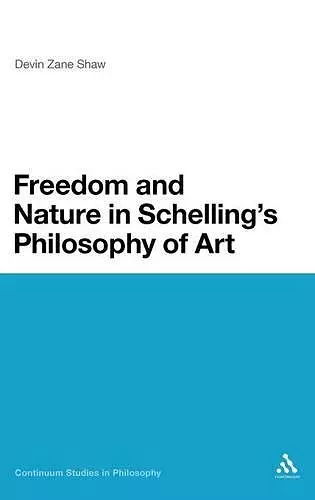Freedom and Nature in Schelling's Philosophy of Art
Format:Hardback
Publisher:Continuum Publishing Corporation
Published:10th Feb '11
Currently unavailable, and unfortunately no date known when it will be back

Establishes the centrality of art in Schelling's philosophical thought.
Schelling is often thought to be a protean thinker whose work is difficult to approach or interpret. This title shows that the philosophy of art is a guiding thread to understanding Schelling's philosophical development from his early works in 1795-1796 through his theological turn in 1809-1810.Schelling is often thought to be a protean thinker whose work is difficult to approach or interpret. Devin Zane Shaw shows that the philosophy of art is the guiding thread to understanding Schelling's philosophical development from his early works in 1795-1796 through his theological turn in 1809-1810. Schelling's philosophy of art is the keystone of the system; it unifies his idea of freedom and his philosophy of nature. Schelling's idea of freedom is developed through a critique of the formalism of Kant's and Fichte's practical philosophies, and his nature-philosophy is developed to show how subjectivity and objectivity emerge from a common source in nature. The philosophy of art plays a dual role in the system. First, Schelling argues that artistic activity produces through the artwork a sensible realization of the ideas of philosophy. Second, he argues that artistic production creates the possibility of a new mythology that can overcome the socio-political divisions that structure the relationships between individuals and society. Shaw's careful analysis shows how art, for Schelling, is the highest expression of human freedom.
"Philosophy of art provides a privileged opening onto the complexities and metaphysical dimensions of Schelling's system, an amorphous construction that extends through the diverse productions of the philosopher's lifetime. Fittingly, Devin Shaw has adopted a genetic approach, following the philosopher's virtually inchoate accounts of art in his early writings, through its explicit embodiment in his philosophy of identity, to the later writings on art, which, because of their apparently marginal character, are usually overlooked. Dr. Shaw's original and important contribution shows how Schelling's philosophy of art is informed by his earlier philosophy of nature, while anticipating his later work on the metaphysics of freedom and his crepuscular writings on mythology." - Jeffrey Reid, Associate Professor, Philosophy, University of Ottawa, Canada
Shaw has given us a thoughtful retrieval of the problem of art that invites us into the epicenter of Schelling's project. -- Notre Dame Philosophical Reviews
‘Shaw's careful analysis of the various ways in which art is significant for Schelling provides a sorely-needed guide for readers of Schelling's difficult work.' -- Symposium
ISBN: 9781441156242
Dimensions: unknown
Weight: unknown
192 pages